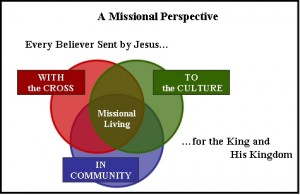
Missional theology, when correctly understood as a way of seeing the church missio Dei, sees the church as an alternative community that witnesses corporately by living as the new community in the power of the Spirit. The church exists for others, not for itself. It is mission before it even thinks about “doing” mission. Read that sentence again. We have thought of mission as something the church does for many centuries. A fundamental difference between missional thinking about the church, and traditional ideas, is to see the church as mission itself. This theology calls for significant restructuring, not the least of which will be new models for training (missional) new leaders. Rather than being the priests of Christendom, or the defenders and teachers of Reformation truth, or professional clerical counselors and managers, true missional leaders believe that the church needs a more functional and apostolic identity precisely because it is God’s mission first and last.
What we need is a biblically-based theology that will take seriously the church’s missional vocation (call). Such a view draws out the consequences of this theology and shapes the structure and institutions of the church. This is what missional theology really means. Such a theology of the church should then lead us as practitioners to work out the missio Dei in true love.
Stanley Hauerwas, in an online Australian Broadcasting Corporation Religion & Ethics piece (published July 2, 2013), cited historian Mark Noll’s thesis that America’s God is really “a synthesis of evangelical Protestantism, republican political ideology and commonsense moral reasoning.” Americans have been able to synthesize these antithetical traditions by making their faith in God indistinguishable from their loyalty to their country. I believe Bonhoeffer was right when he said American Christianity was “Protestantism without Reformation.”
Hauerwas, following Mark Noll’s thesis, concludes that “the god most Americans say they believe in is just not interesting enough to deny. The only kind of atheism that counts in America is to call into question the proposition that everyone has the right to life, liberty and happiness.”
The best answer I’ve seen to “the god most Americans say they believe in” is a robust and carefully developed missional theology.
Related Posts
Comments
My Latest Book!

Use Promo code UNITY for 40% discount!






“The church exists for others, not for itself. It is mission before it even thinks about “doing” mission.” Amen
Waldron Scott liked this on Facebook.
Al Streett liked this on Facebook.
James H Kim liked this on Facebook.
Bob Page liked this on Facebook.
RT @JohnA1949: The Missional Perspective and Its Meaning for the Church in North America: A theology of the church that confess… http://t…